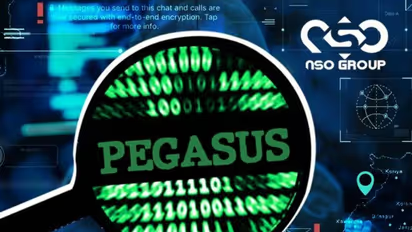IT Minister in Parliament: Claims on Pegasus use have no substance, questions timing of report

Synopsis
Making a statement in the Lok Sabha over the reported use of spyware Pegasus, Ashwini Vaishnaw clarified that any form of illegal surveillance is not possible with the checks and balances present with the legal framework and its robust institutions.
Information Technology minister Ashwini Vaishnaw on Monday said that the press reports on the alleged use of spyware Pegasus to compromise phone data of some persons appearing a day before the Monsoon session of Parliament could not be a coincidence.
Making a statement in the Lok Sabha over the reported use of spyware Pegasus, Vaishnaw clarified that any form of illegal surveillance is not possible with the checks and balances present with the legal framework and its robust institutions.
Also Read: How does Pegasus spyware work? Can you detect it on your phone?
He said the media reports claimed that a consortium got access to a leaked database of 50,000 phone numbers. The allegation is that individuals linked to these phone numbers were being spied upon. However, the report says that the presence of a phone number in the data does not reveal whether a device was infected with Pegasus or subject to an attempted hack. Without subjecting a phone to this technical analysis, it is not possible to conclusively state whether it witnessed an attack attempt or was successfully compromised."
"The report itself clarifies that presence of a phone number doesn't amount to snooping," he said.
Urging Parliamentarians to examine the issue in the light of facts and logic, Vaishnaw said, "I am sure my colleagues in the Opposition who have been in the government for years would be aware of the protocols. They would also be aware that any form of illegal surveillance is not possible with the checks and balances in our laws and our robust institutions."
Also Read: Israeli surveillance firm rejects claims about Pegasus spyware misuse
"In India, there is a well-established procedure through which lawful interception of electronic communication is carried out for the purpose of national security, particularly on the occurrence of any public emergency or in the interest of public safety, by agencies at the Centre and States. The requests for these lawful interceptions of electronic communication are made as per relevant rules under the provisions of section 5(2) of Indian Telegraph Act,1885 and section 69 of the Information Technology Act, 2000," he said.
"Each case of interception or monitoring is approved by the competent authority. The competent authority in the state governments have these powers in the IT (Procedure and Safeguards for Interception, monitoring and Decryption of Information) Rules, 2009," Vaishnaw added.
Also Read: Govt: Claims of snooping using Pegasus are conjecture, an attempt to malign Indian democracy
"The publisher of the report states that it cannot say if the numbers in the published list were under surveillance. The company whose technology was allegedly used has denied these claims outrightly. And the time-tested processes in our country are well-established to ensure that unauthorised surveillance does not occur," the minister said, reiterating that there is no substance behind this sensationalism.
Find the latest Technology News covering Smartphone Updates, AI (Artificial Intelligence) breakthroughs, and innovations in space exploration. Stay updated on gadgets, apps, and digital trends with expert reviews, product comparisons, and tech insights. Download the Asianet News Official App from the Android Play Store and iPhone App Store for everything shaping the future of technology.